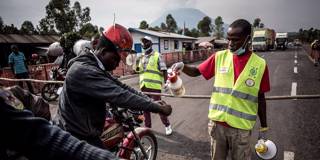Even as large-scale epidemics proliferate, the international community continues to get even the most basic aspects of prevention and preparedness wrong. Nowhere is this more apparent than in the lack of readily available clean water in health-care facilities.
LONDON – A year has passed since the Democratic Republic of the Congo’s health ministry declared a new outbreak of Ebola in the northeast of the country. Yet, far from being contained, the outbreak has now become the DRC’s second in five years to be classified by the World Health Organization as a Public Health Emergency of International Concern, the most severe designation – used just four times previously – that the WHO can make. It is the second-largest Ebola outbreak ever recorded.

LONDON – A year has passed since the Democratic Republic of the Congo’s health ministry declared a new outbreak of Ebola in the northeast of the country. Yet, far from being contained, the outbreak has now become the DRC’s second in five years to be classified by the World Health Organization as a Public Health Emergency of International Concern, the most severe designation – used just four times previously – that the WHO can make. It is the second-largest Ebola outbreak ever recorded.